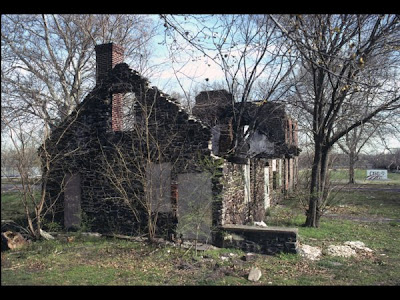Today, Slate Magazine featured the work of Camilo Jose Vegara, who makes it his business to document the slow decay of American buildings and neighborhoods. His photographs are utterly fascinating to me, but what really caught my attention today was his photograph of the William Cooper Manor House located in Camden, New Jersey.
West New Jersey
Articles related to West New Jersey History and Genealogy
West New Jersey in 1687, Part Two
West New Jersey In Debt
The West Jersey Assembly met in May of 1687. The minutes of their meeting are not included in Leaming and Spicer’s Grants and Concessions, so for many years, people thought they had not met at all. We know of two matters undertaken by the Assembly in 1687. The first was the problem of the Province’s debt. Despite the fact that taxes had been levied, they could not be collected. Much of this was due to the scarcity of coin, which had to come from abroad. By May of 1687 the debt had risen to £1,250.
West New Jersey in 1687, Part One
The year 1687 was intense for West New Jersey and for England in matters concerning politics and management of land, but not very much for the families of Gloucester who might have been connected with Samuel Green. If your interests are limited to genealogy, then you must wait for part two of 1687. If the politics of days long gone are your fancy, then this year and the next will be of particular interest.
John Reading and the Town of Gloucester, 1686
The Town of Gloucester
Over the years of researching Hunterdon County history, I have often wondered about the early settlers of Gloucester, because many of them became early settlers of or investors in Hunterdon County, chief among them John Reading and Richard Bull. Now, thanks to this blog, I have a chance to learn about this town and how Reading and Bull fit into its history.
West New Jersey, 1686
Straws in the Wind
In 1686, there were a few events that boded ill for West New Jersey.
The Declaration of Indulgence, which James II issued in March (or April), was James’ attempt to get the Protestant English accustomed to having Catholics and dissident Protestants more visible in daily life. It granted amnesty to those imprisoned under laws against the practice of these religions. Following this, James granted many commissions to Catholics in the army. Seems like a good thing, but it was also a good example of how James misread his subjects, who truly feared that a strong Catholic sovereign like James might turn their country into an appendage of Catholic France.
West New Jersey, 1685
The New King
On February 2, 1684, Charles II, only 54 years old, suffered a stroke. Perhaps he might have survived it, but given the medical practices of the day, he was doomed to die, which he did four days later. His brother James was now King of England.
How to Survive in West New Jersey
Recently a friend, Ian Schoenherr, sent me a copy of a painting by Howard Pyle that beautifully depicts the life of the first settlers along the Delaware River.
West New Jersey, 1684
Note: This article is the 11th in a series that I began on August 20, 2009, concerning the Green family and the early settlement of the Province of West New Jersey.
The Assembly and the Contest for Governor
Through letters to the proprietors in West Jersey, Edward Byllinge had made it clear that he had no intention of acceding to the demands of their Assembly. In response, during the Assembly session of March 1684, Samuel Jennings and Thomas Budd were appointed to travel to England to make their demands to Byllinge in person. Thomas Olive was chosen to act as deputy governor during their absence.
West New Jersey – 1683
Edward Byllinge As West New Jersey’s First Governor
Just to review, in 1680, James Duke of York, with prodding from William Penn, agreed to confirm the 1664 grant of West New Jersey to John Lord Berkeley. This, along with a special deed, confirmed the grant to Edward Byllinge, Berkeley’s successor. Byllinge thereby claimed the governorship of the colony, even though there was no provision for the position of Governor in the Concessions & Agreements.1
West New Jersey, 1682
 The Irish Tenth
The Irish Tenth
During the winter, the Irish Quakers who had arrived at West New Jersey in September 1681, were given shelter in Salem. When spring 1682 arrived, they set to work building their own settlement. The location they chose was a site opposite what would soon be Philadelphia. They laid out their own Tenth, running from Timber Creek to Pennsauken Creek, and established a town center called Newton. The original site of Newton was in the present-day city of Camden.

